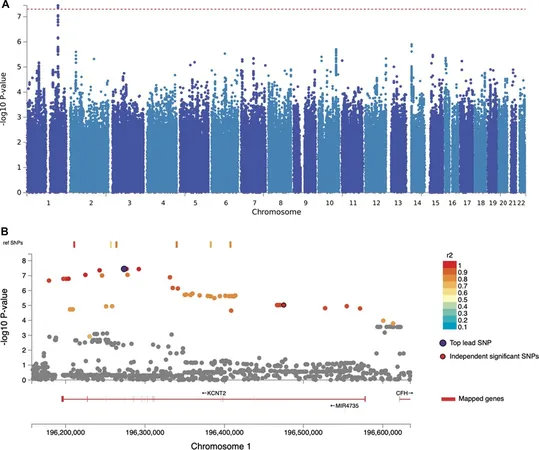
Groundbreaking Study Reveals Genetic Links to Neuropathic Pain – What You Need to Know!
2024-10-30
Author: Yu
Introduction
Neuropathic pain is a debilitating condition that arises from damage to the nervous system, manifesting as intense sensations such as burning, shooting, tingling, or stabbing. Commonly associated with conditions like diabetes and nerve injuries, neuropathic pain is notorious for its chronic nature and significant impact on an individual's quality of life. Treatment can be particularly challenging, as the underlying causes and mechanisms remain poorly understood, leaving many sufferers without effective relief.
Comprehensive Research Study
In an extensive research effort, experts from the University of Bergen, Lund University, and the University of Oxford—alongside the European DOLORISK consortium—conducted the most comprehensive multicenter cohort study to date, meticulously examining various clinical presentations and pain subtypes. Their findings have been published in the esteemed journal Pain and are set to revolutionize our understanding of this complex condition.
Exciting Findings
Professor Valeriya Lyssenko from the University of Bergen and Lund University, along with Professor David Bennett of the University of Oxford, expressed their excitement over the results, stating, “We are thrilled to confirm previously suggested genetic markers of neuropathic pain while also uncovering new ones. Notably, targeting potassium channels (KCNT2) in sensory neurons could pave the way for effective pain management, including reducing mechanical pain sensitivity. This is a groundbreaking link to pain genes in humans for the first time.”
The Role of Genetics and Other Influencing Factors
The study particularly highlighted the significant genetic signals evident in diabetic patients suffering from neuropathic pain. Astonishingly, it suggested causal associations between clinical factors such as low insulin levels, depression, and alcohol use disorder with the severity of neuropathic pain. This emphasizes the dire need for healthcare providers to not only monitor insulin secretion but also to assess mental health among diabetic patients, as these factors may exacerbate pain.
The researchers found that sensory neurons contribute to persistent pain due to two notable genetic issues: the insensitivity of opioid receptors (OPRM1) and hyperactivity of sodium channels (SCN9A). Individuals with certain genetic variants in opioid receptors might require higher doses of pain medication to achieve relief, complicating pain management strategies and underscoring the necessity for personalized treatment plans.
A Connection to Our Ancestry?
Adding an intriguing twist, the study revealed that one of the advantageous traits in the sodium channel (SCN9A) can be traced back to our Neanderthal ancestors. This fascinating link suggests that our genetic heritage may continue to influence pain experiences today, blending our ancient past with modern health challenges.
Conclusion and Future Outlook
As this vibrant research community gears up for further validation in a larger cohort, the implications of these findings could reshape the future of neuropathic pain management. For those suffering from this perplexing condition, the prospect of targeted genetic therapies could soon provide much-needed hope and relief. Keep an eye on this evolving story—it’s bound to change the conversation around neuropathic pain and its treatment!




 Brasil (PT)
Brasil (PT)
 Canada (EN)
Canada (EN)
 Chile (ES)
Chile (ES)
 España (ES)
España (ES)
 France (FR)
France (FR)
 Hong Kong (EN)
Hong Kong (EN)
 Italia (IT)
Italia (IT)
 日本 (JA)
日本 (JA)
 Magyarország (HU)
Magyarország (HU)
 Norge (NO)
Norge (NO)
 Polska (PL)
Polska (PL)
 Schweiz (DE)
Schweiz (DE)
 Singapore (EN)
Singapore (EN)
 Sverige (SV)
Sverige (SV)
 Suomi (FI)
Suomi (FI)
 Türkiye (TR)
Türkiye (TR)